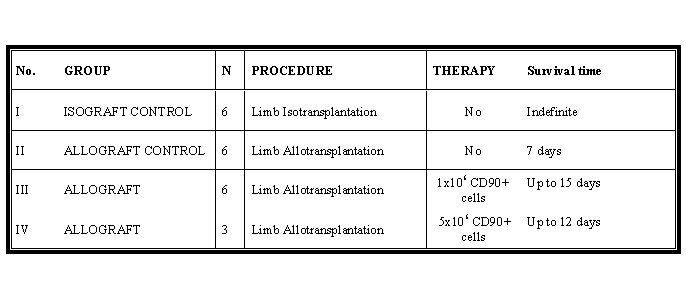Tuesday, October 28, 2003 - 4:35 PM
3848
Intraosseus Injection of the Donor-Derived Bone Marrow Stem and Progenitor Cells Increases Donor-Specific Chimerism and Extends Composite Tissue Allograft Survival
Purpose: This study was designed to investigate the effect of the intraosseous allotransplantation of the donor specific stem and early progenitor cells on the level of donor specific chimerism and survival rate of the rat hindlimb allograft transplants. Material and Methods: Twenty-four rat hindlimb allotransplantation (LA) were performed across MHC mismatched barrier between Lewis-Brown-Norway (LBN, RT1n+1,F1) and Lewis (LEW, RT1l) rats in 4 groups, six animals each. Isografts and allografts rejection control group received no treatment. In the experimental group 3 and group 4, 1x106 and 5x106, respectively, bone marrow stem and progenitor cells were injected intraosseously into recipients tibia during limb transplantation. Bone marrow stem and progenitor cells separation was performed by targeting stem and progenitor cells with mouse anti-rat FITC - conjugated CD90 monoclonal antibody (BD, San Jose, CA) and tagging with goat anti FITC magnetic-beads conjugated, followed by isolation on the MiniMACS LS+ columns. Separated and purified (efficacy >95%) stem and early progenitor cells were injected intramedullary into the bone marrow cavity of the recipientís contralateral limb. Results: Transplants from isograft group survived indefinitely. Allograft controls rejected transplants uniformly on day 7 after limb transplantation. The injection of separated and purified CD90+ stem and progenitor cells of the donor origin extended survival of the transplanted limb up to 15 days in group 3 and up to 12 days in group 4. Conclusion: In this preliminary study introduced a novel method of transplantation of the stem and early progenitor cells of the donor origin into the recipients bone marrow cavity .This technique of intraosseus injection of donor stem cells resulted in the extension of allograft survival. Further studies combining immunomodulatory therapies and stem cells transfer are in progress.
View Synopsis (.doc format, 644.0 kb)
See more of Hand, Upper Extremity/Microsurgery
Back to Plastic Surgery 2003 Complete Scientific Program
Back to Plastic Surgery 2003 Meeting home

